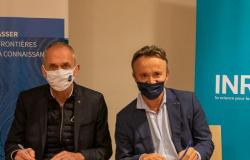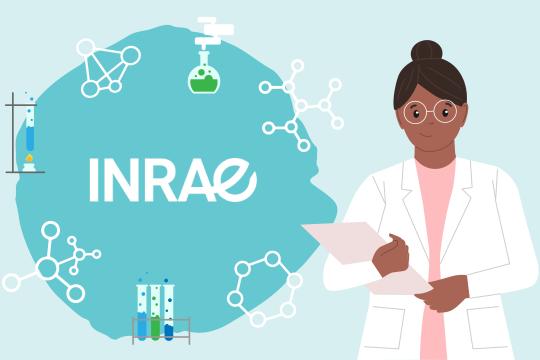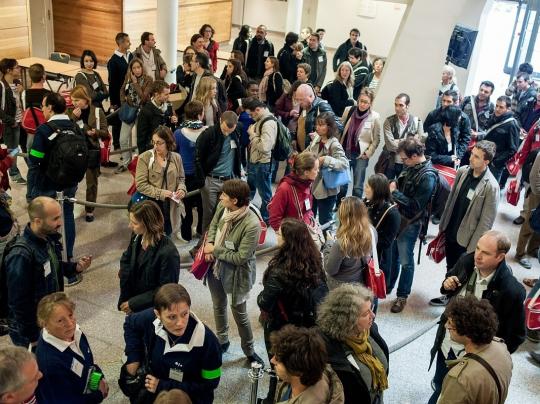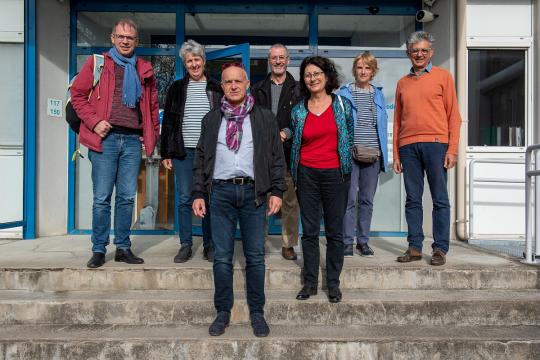Corporate social responsibility at INRAE
Committed to social responsibility, INRAE engages in constant dialogue with internal and external stakeholders. Its broader objective is to contribute to the UN’s Sustainable Development Goals, which are the foundation for the institute's 2030 roadmap. INRAE is thus striving to maximise the positive environmental, social, and economic impacts of its work.
Uniting people around common values
INRAE resolutely aligns all its activities with its scientific policies, which promote sustainable agricultural systems, nutritional diets, and environmental health.
As a publicly funded institute, INRAE must hold itself to a higher standard in its research and support work, which have major environmental, social, and economic impacts.
The same is applicable in the professional lives and practices of all its staff, regardless of job responsibilities or hierarchical position.
From an operational perspective, INRAE is striving to fulfil its environmental commitments by regularly publishing greenhouse gas emissions reports, developing an ambitious yet realistic carbon neutrality plan, reducing levels of pollution, and both preserving and restoring biodiversity.
In early 2022, INRAE’s CEO Philippe Mauguin shone a spotlight on the institute’s plan for fostering corporate social responsibility, which was launched last year following extensive collaborative efforts. The plan includes contributions made by many internal and external partners, including over one hundred national and international stakeholders.
Our commitments
Preserving the environment
Saving energy and resources, encouraging responsible mobility choices, reducing waste, making sustainable purchasing decisions, and preserving biodiversity...INRAE has adopted several measures for reducing its environmental impacts that include an environmental management system and internal carbon plan.

Antoine Petit, CNRS Chair & CEO, and Philippe Mauguin, INRAE Chair & CEO, recently signed a new five-year framework agreement to underline their research institutions' commitment to working even more closely together. Natural long-standing partners, the two institutions have committed to heightening the joint production and promotion of high-level scientific knowledge to help achieve the United Nations' Sustainable Development Goals (SDG).
Improving life at work
Recipient of AFNOR’s Equality and Diversity at Work ("Alliance") certification and the European Commission's Human Resources (HR) Excellence in Research Award, INRAE is dedicated to continually improving quality of life at work. The institute is devoted to producing high-quality, meaningful research while fostering excellent employment conditions and applying an effective management approach. These efforts allow INRAE and its staff to flourish.

Dual AFNOR certification, a European label, day-to-day action plans. Now, more than ever before, INRAE is devoted to diversity, eliminating discrimination, and gender equality in the workplace…Recap of a recognised and deepening commitment.
Fostering exchanges and transparency
Society has extremely high expectations for INRAE, which are accompanied by a desire to understand the institute’s research approaches, objectives, and timelines. We make our work accessible to everyday citizens via educational efforts. Furthermore, we are dedicated to fostering debate and exchange around issues of societal importance, which means creating space for opposing viewpoints, exploring controversies, and providing scientific grounding in discussions.

The Open Science movement invites all types of stakeholders, including everyday citizens, to contribute to the research process. It seeks to make research products (e.g., scientific publications, data, software) accessible to the scientific community and society as a whole. It is a way to advance knowledge and build relationships of trust with diverse collaborators.
Our news
Strategic approach
With its high-quality CSR action plan, INRAE is a trailblazer among public scientific and technological institutions
INRAE’s CSR strategies are under the direct supervision of the institute’s CEO and management board. The plan is carried out by the CSR office, with the support of all of INRAE. The office came into existence on October 1, 2021, and is headed by Director Armelle Carnet.
Its work is informed by the most recent national policies in this domain, such as sustainable development and social responsibility guidelines for higher education and research (HER) institutions and French environmental policies for government employees (Services publics écoresponsables).
The office also has a monitoring committee and a steering committee that request assistance from internal and external stakeholders on an ad hoc basis.
INRAE’s support networks (e.g., HR, purchasing, communication, facilities management) work together to implement the plan, each taking action in its own area of expertise.
INRAE’s CSR action plan and its four strategic priorities
INRAE’s first CSR action plan covers the period from 2021 to 2025 and establishes concrete, pragmatic strategic objectives driven by four structural priorities:
- Establishing a framework that will ensure the plan’s implementation
- Guaranteeing full alignment of the institute’s research, operations, and professional practices
- Evaluating and controlling the institute’s environmental impacts by striving to reduce negative effects and boost positive effects
- Promoting institutional policies that improve quality of life at work as an employer committed to social responsibility.






